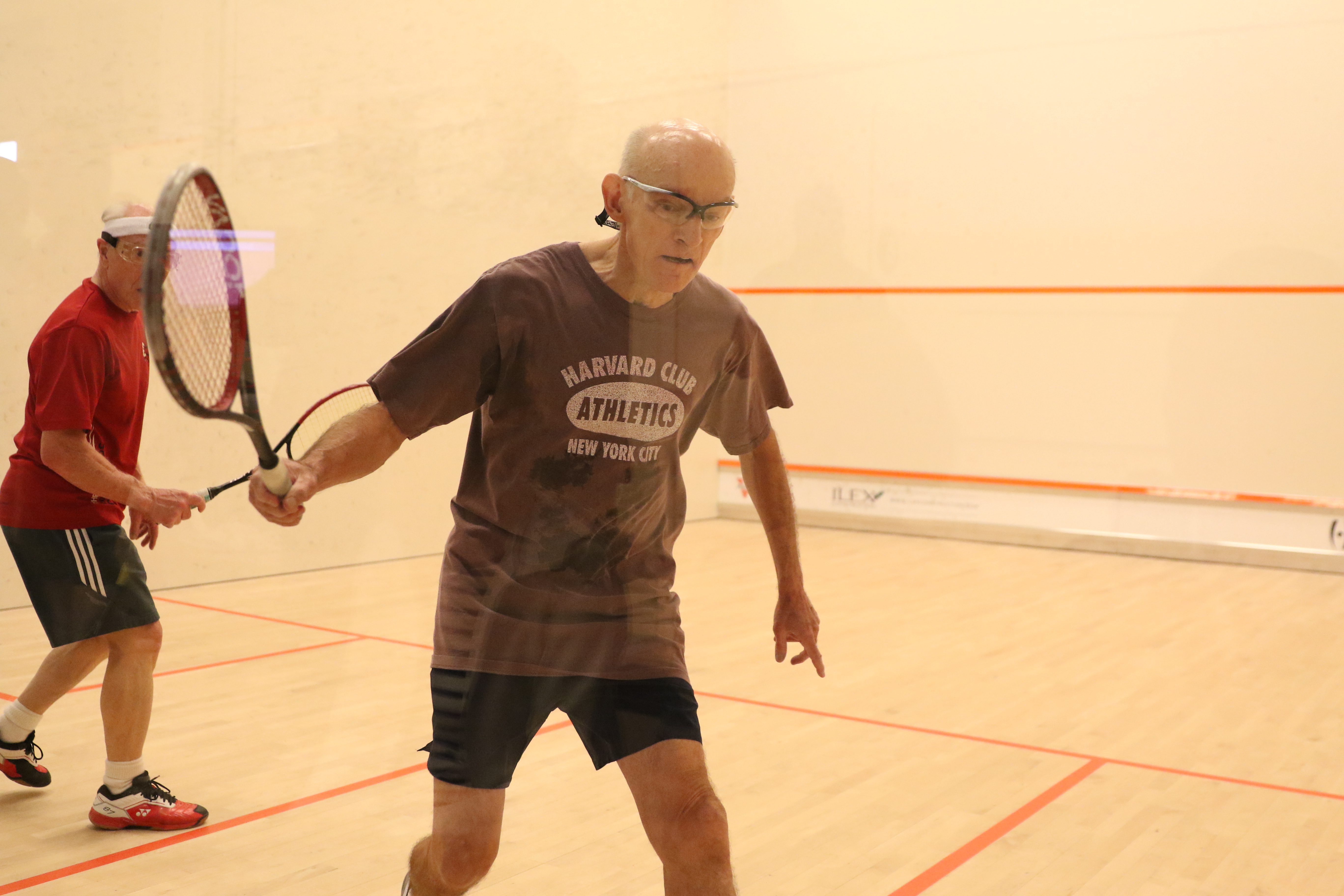
by Bill Buckingham
Not only does seventy-four-year-old Jay Nelson clearly recall winning his first championship in any sport—the 1954 little league title in Saugus, MA, as a second baseman and pitcher—he also remembers many of the sixteen players he struck out hurling a perfect game at the age of twelve. While thirteen-year-old Marina Stefanoni’s recollection of her first sporting title—the 2013 GU11 at National Juniors—is to be expected, what she has done in the ensuing three years is remarkable.
Nelson and Stefanoni might be sixty-one years apart in age but they both won historic national titles this spring. The seventy-four year-old Nelson, who lives in New York City, won his record twenty-ninth masters title, while Stefanoni, a thirteen-year-old Darien, CT-native, became the youngest player ever to win the National Juniors U19 division.
Nelson’s journey to his twenty-ninth title was a long one. After losing three straight years in the finals of 70+ division to Gerry Poulton, Nelson finally defeated Poulton in three games in this year’s 75+ final.
As a junior at Andover, Nelson was guided to squash by his basketball coach, who gently suggested he may not be varsity material. Nelson had previously never played any racquet sport other than table tennis. He was thrashed in the first round of the first tournament he ever played in, the New England Inter-Scholastics, by a far more experienced player. Fifty-seven years later, on his way to his record-setting title, Nelson defeated that same player, Bob Hetherington, in the quarterfinals.
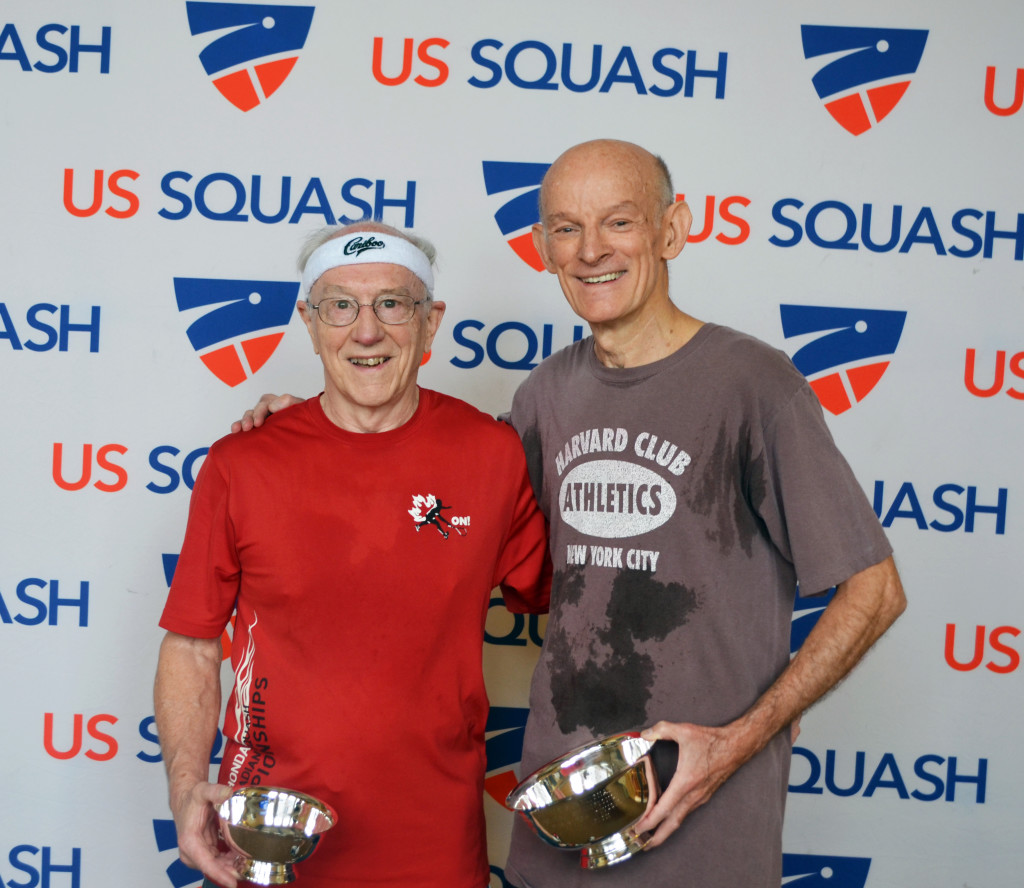
able to secure his record title.
Nelson played college squash at Harvard, went into the Army for three years and then attended Harvard Business School. It was there in Cambridge, after a five-year hiatus, that he returned to the game and launch his U.S. Squash Hall of Fame career. “If I hadn’t gone to business school, who knows?” Nelson said. “The courts were right there. I was too busy my first year, but my second year I had more time and got back into it.”
After moving to New York to work as a securities analyst, Nelson continued playing. From 1992 till 2004, Nelson secured a remarkable thirteen consecutive national titles, winning the 50+ and 55+ five times each, before taking down three consecutive 60+ championships. He won five more times in the 65+ draw, including 2010 in Newport, when down 10-6 to Poulton in the fifth game of the finals, he came storming back. Of all the wins, that victory has stuck in his mind. “It was a matter of perseverance. I literally said to myself, you’re probably going to lose, but you may as well play out all of the points as hard as you can.” Nelson moved into the 70s in 2012, where he captured his record tying twenty-eighth masters title.
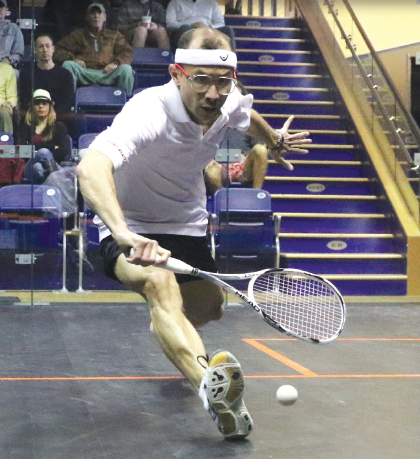
Richard Chin, was a key factor to Nelson’s title run.
He stayed tied there with Goldie Edwards, his fellow class of 2015 Hall of Fame inductee, the pursuit of the record temporarily stalled. In both 2013 and 2014 he was soundly beaten by Poulton in three-game finals. In 2015, Nelson came back from two games down in the final, only to lose the deciding fifth game.
A few months before this year’s nationals, Nelson, who played regular games at the Harvard Club of New York with Bob Horn and Ross Hallock, was advised by his pro, Richard Chin, to play lower-rated players who shoot a bit more to prepare better for age group play. “I started playing guys who go for winners quicker,” said Nelson. “I had been playing too many guys who hit the heck out of the ball, so in the last month or so before the Nationals Singles, I played guys who are more likely to go for it the moment they have an opening. That’s the way we play in age groups. It made me more oriented, more alert and ready to run. ” Chin’s advice proved to be just what Nelson needed to turn the tables on his old rival in Charlottesville. After nearly getting tripped up by Bert Konyei in a five-game semifinal, he regrouped to win the 29th title.
After his win, Nelson remarked that “a combination of commitment to the sport and a love of seeing the guys every year” is what keeps him coming back to the National Singles.
Stefanoni is someone who someday might threaten Nelson’s age-group record.
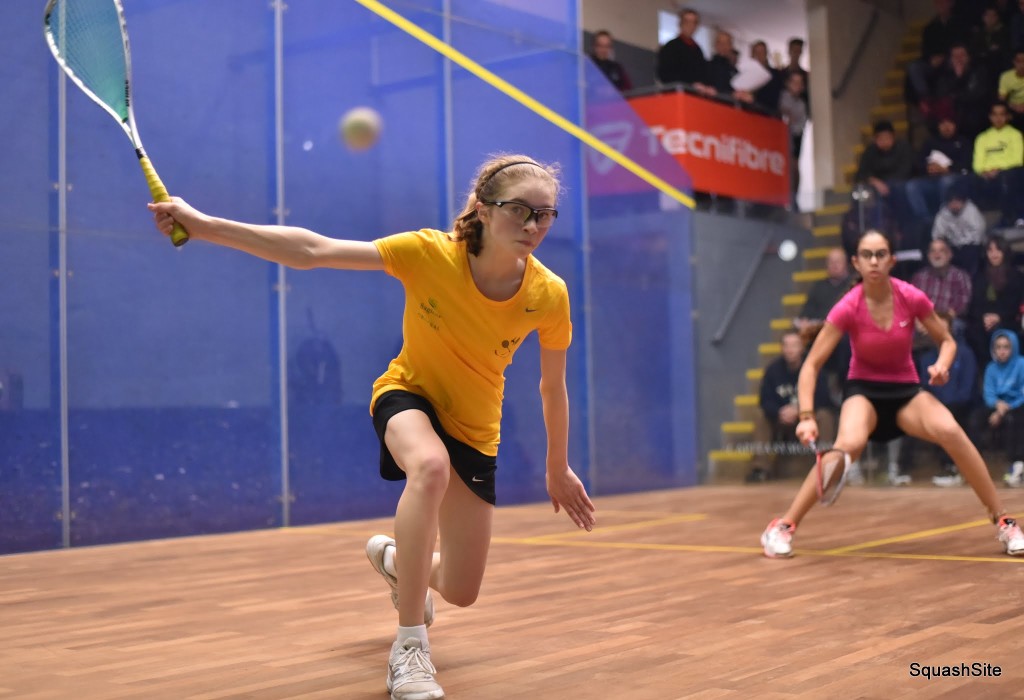
with her win over top seeded Jana Shiha
at the 2016 British Junior Open.
Stefanoni gravitated to squash because, according to her father Chris, she was too good at team sports. Her dominance at soccer once included a scoring spree of more than ninety goals over three matches; this led to league official setting restrictions on her playing time. So when she was nine, she started playing squash. “I hit a lot my by myself, then with my dad,” Stefanoni said. “I started playing some bronze and silver tournaments, it was fun. I started to get better and play at higher levels and really enjoyed it. I’m very competitive. Squash is one on one, if you win, you win, if you lose, it’s your fault and it gives you something to work on.”
Stefanoni’s rise in junior squash has been meteoric. After losing in the GU11 finals of the Bronze Championships in 2012, she won the GU11 at the National Juniors in 2013 and followed up with consecutive GU13 national titles in 2014 and 2015.
This season she moved up to the GU19s and defeated Chloe Chemtob in four games at the National Juniors, eclipsing the old mark of Lily Lorentzen, who won at age fifteen, as the youngest to ever take the under-nineteen title. Stefanoni could win five more GU19 titles—the most ever is Lorentzen’s four.
Marina has not just taken the U.S. squash scene by storm; she has also been a sensation on the world stage. Her international pedigree took off north of the border at the Canadian Junior Open in December 2014 where she won the U15 title. Over the ensuing months, the then twelve-year-old went on to win U13 titles at the U.S. Junior Open, Scottish Junior Open and became the first American to win a French Junior Open title. In the 2015 British Junior Open U13—widely considered the highest level of junior squash outside of the world championships—Stefanoni reached the quarterfinals—Team USA’s best finish in any division.
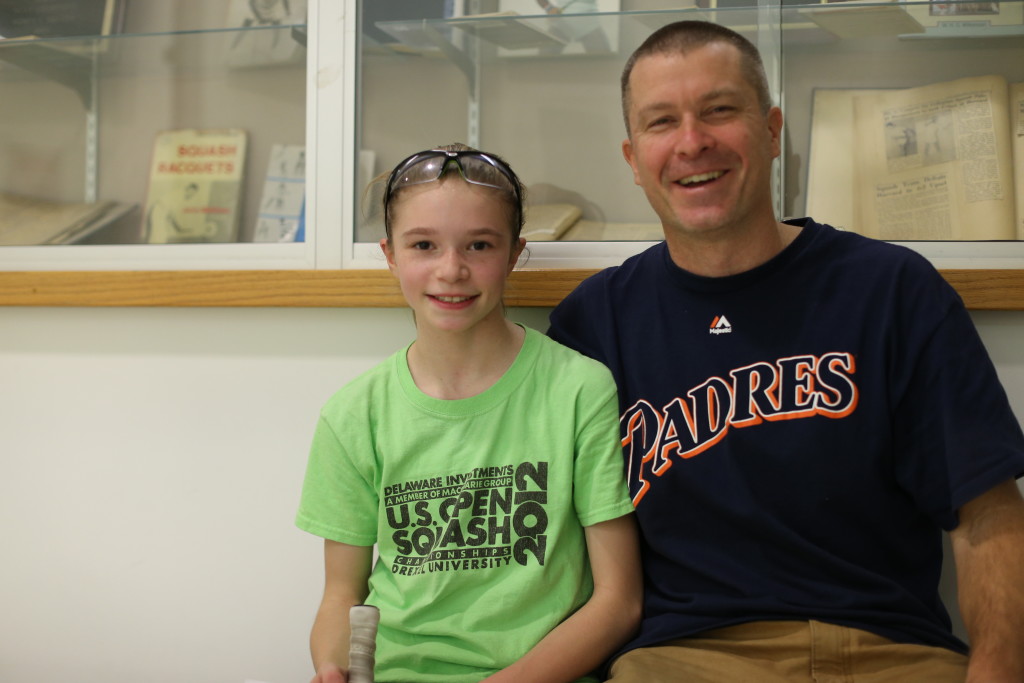
started playing squash at age nine.
Stefanoni continued to earn international accolades during the summer of 2015, racking up Malaysian Junior Open U13, Dutch Junior Open U15 and Hong Kong Junior Open U13 titles. Her performances merited a call up to Team USA’s delegation sent to the Pan American Junior Championships in September 2015. In Resistencia, Argentina, Stefanoni went undefeated in team play, contributing to Team USA’s silver medal finish. Ganek Family US Squash Head National Coach Paul Assaiante recalled the crowds being “wowed through her dominance in team play and this as a twelve year old.”
Traveling abroad is one of her favorite aspects of squash. “I like traveling, its amazing meeting new people and making new friends. Playing tournaments I get more experience and more competition, I get to know more about the world.”
Her biggest splash globally took place this past January at the 2016 British Junior Open. In the GU15s she became the first American to reach a BJO final since Amanda Sobhy in 2011. In the semis, she upset Egypt’s Jana Shiha, the top seed, saving two match balls in the fifth game. While she did lose in the final against Malaysian two-seed Aifa Azman, her performance illuminated the rising level of her game.
In the current world junior rankings, Marina is the youngest player in the top 100 U19 players. She is ranked twenty-third. Stefanoni will don red, white and blue once again this summer in the Women’s World Junior Individual Championship in Poland.
While she travels around the world looking for the best competition, her biggest future rival may reside in her own house. Marina’s eleven-year-old sister Lucie is following in her footsteps—this season at age eleven she won the GU13 draw at the National Juniors. Right now they compare notes on their squash. “We talk about how we played,” said Marina, “how we should play in the future, analyzing our games.”
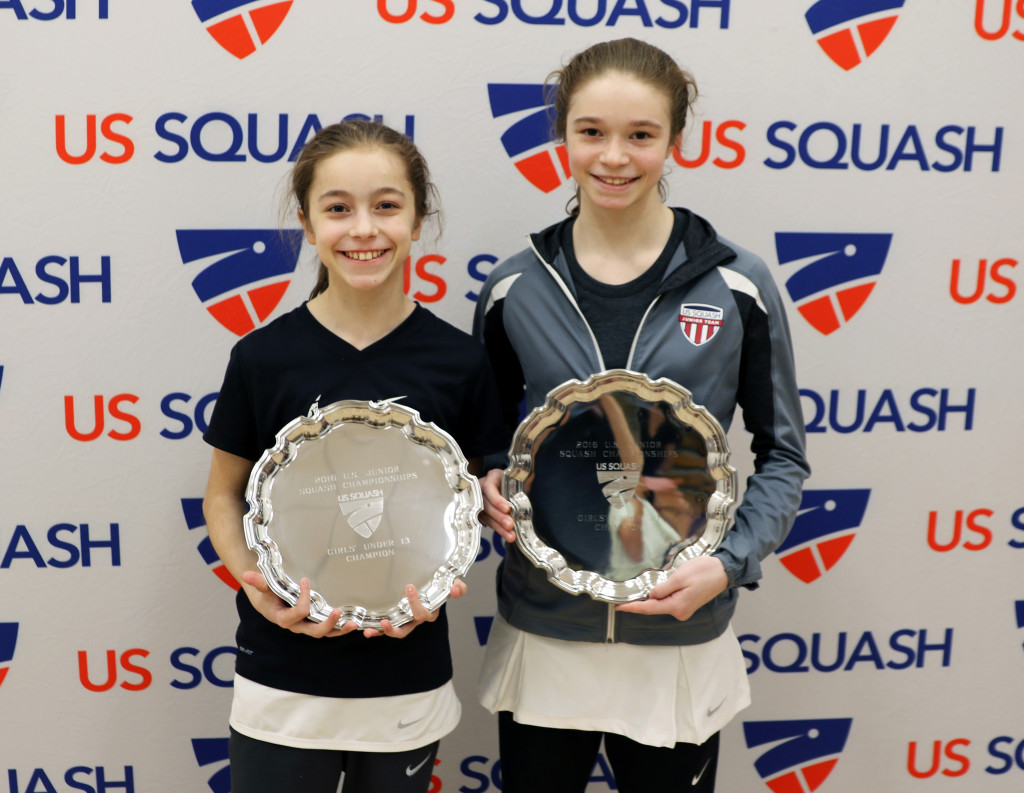
the GU13 title at the 2016 National Juniors.
Chris Stefanoni is quick to point out that Lucie is very important to Marina’s success. “Lucie and Marina practice a lot together. She is the perfect sparring partner for her. If Marina makes any kind of unintelligent shot, Lucie wins the point.” While Marina may have already won the top junior prize in the U.S., she continually works on her game with the Chelsea Piers Connecticut coaching staff including Supreet Singh, Reinhold Hergeth, Arturo Barreto and Natalie Grainger.
While conditioning comes naturally to a thirteen-year-old, she is trying to focus more on where to hit the ball, and shot selection. Besides being a champion squash player, Marina is a straight A student. Her favorite subject is math and the parallels to her squash game are evident. “There is always a way to figure out an answer,” she said. “I like the feeling when you get a tough problem and figure it out.”
When Nelson was apprised of Stefanoni already winning her fourth title at age 13, he knew there will be no retirement in the near future. “Oh my god. I am going to have to play indefinitely then,” he exclaimed. “I have no intention of giving up my record.”


